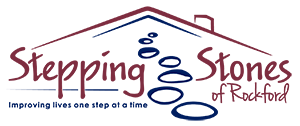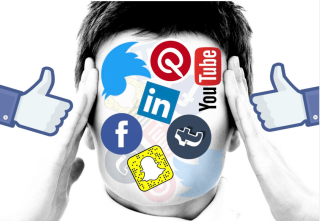News/Blog
Social Media + Mental Illness = ?
Social media is part of daily life for more people than not. Staying in touch with friends, keeping an eye on the news or even laughing at memes can have positive impact as we plug along day-to-day. Unless you're still using a non-Internet-enabled flip phone and a typewriter, it's hard to escape the ubiquity of social media. Used with balance, moderation and self-regulation, social media is a tool with much to enjoy.
Right?
Google "mental illness social media" and you get quite a variety of views:
It's horrible and worsens depression!
It's great, bringing people together!
It's ruining our children and our society!
I've learned to control my anxiety from an online support group.
I hate all that political arguing—I can't sleep at night knowing my Uncle Bob wrote that!
From the perspective of a licensed counselor, I decided to do a quick internet search specific to social media's impact on adults with serious mental illness. Clients at Stepping Stones peruse the various social media platforms on their ever-present cell-phones, no different than their counterparts who don't happen to have a diagnosis of schizophrenia, schizoaffective disorder, Bipolar Disorder, along with personality disorders. What are the pros and cons for "our" clients?
Let's bust some stigma here: yes, those with chronic mental illness have Facebook accounts, follow Twitter, scroll through Instagram posts and might even "snap!"
Social media has many positive attributes; it allows us to build connection with others, voice an opinion, learn skills and find support. Our clients can follow NAMI (National Alliance on Mental Illness) on various social platforms, allowing for education, feeling of connectedness and finding links to therapeutic resources. Educational videos on WRAP (Wellness Action Recovery Plan), DBT (Dialectical Behavior Therapy), relaxation and meditation are wonderful, free recovery tools. There is a "normalcy" to using social media, listening to music, texting a friend or laughing at a funny video viewed on a cell phone. Local agencies post information on available services and share information on the topics related to their services. Support Groups offer information, advocacy, encouragement and even hope. Social media makes it possible to "take part" in Mental Illness Awareness Week activities without even leaving the house. I utilize social media as part of my counseling efforts (more on that later). Who doesn't find photos of puppies, kittens and food relaxing and soothing? Talk about good coping skills to learn…
…Charge up that cell phone and let's go scrolling!
Of course, it's not that simple. Social media can have negative impact, too. Feelings of isolation might result—this from the tool I just said brings connection to many! False information, negative posts, bullying and even reliance on social media in an addiction-like manner are all too common, chronically mentally ill or not. Staying up late into the night arguing with a veritable stranger (or troll) does little to help with recovery efforts; after all, regular sleep and less stress tend to be important components of the recovery. Distorted thinking, anxiety and depressive symptoms may be inadvertently exacerbated by incorrect information or stigma-fueled posts. Distraction is inevitable. Trigger warnings are not the norm on posts. I add, "Don't even get me started on conspiracy theory videos!"
In other words, the answer is somewhere in the middle for ALL of us. Social media isn't good or bad; it just IS.
As a licensed counselor, I strive to help clients find balance, employ moderation and build tools that allow recovery. Social media can be part of that effort. These "tools" encourage healthy social media boundaries, which in turn generalize to having healthy boundaries in daily life. I pose questions about the danger of sharing personal information on-line, followed by dangers of doing this in the community. I challenge the client to identify potential adverse results. Social platforms provide me opportunity to ask, "is this helpful and not-helpful toward your treatment goals?" If posts increase anxiety, depression or levels of stress, I can use this to open discussion on "healthier" coping skills. Sometimes, the most therapeutic thing I can suggest is to take breaks from social media. This is a great example of how reflective distance might help further treatment success. Making a pros/cons list about social media use is a great way to illustrate how using a pros/cons list in treatment can make a difference in reaching identified goals. As a therapist who utilizes DBT, I believe making a behavior chains. This tool might reflect how the consequences of being on Facebook are or aren't worth the cost. Taking a few skillful moments before impulsively firing off that angry reply is a good skill for everyone. "Hiding" those hate-fueled posts from Uncle Bob certainly can't hurt. Keeping track of screen time is enlightening—and, at times surprising. I ask, "Is this platform healthy for me today?"
As most things in life, social media brings us a serving of "good" and "bad." Scientific research isn't conclusive. Internet searches bring conflicting data. We are left to make our own decisions. I find social media helpful in my therapeutic endeavors; after all, it's great "grist for the mill," with its positive, negative or somewhere-in-the middle experiences. This is a very personal, individual issue. We make an educated decision and go forth in treatment… and, with life.
Here's to strong passwords, mental wellness and safe surfing for all of us.

